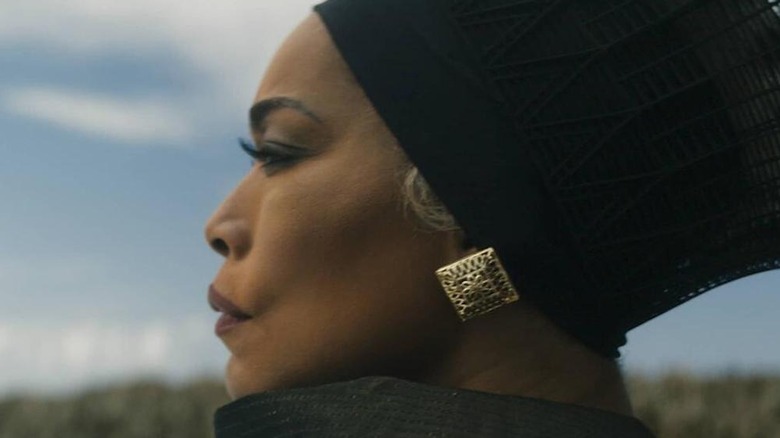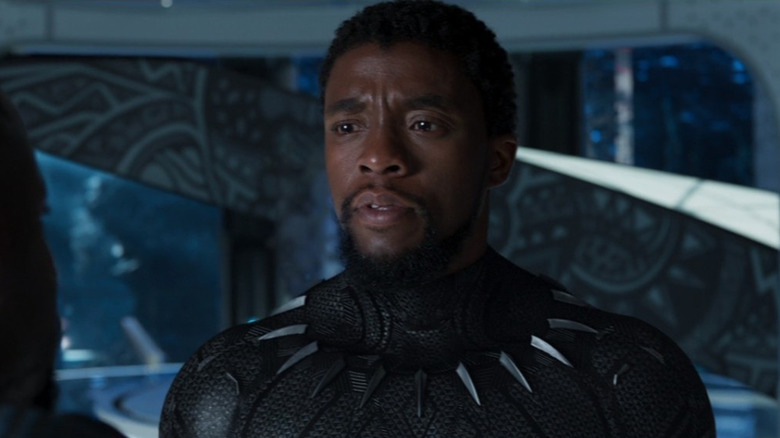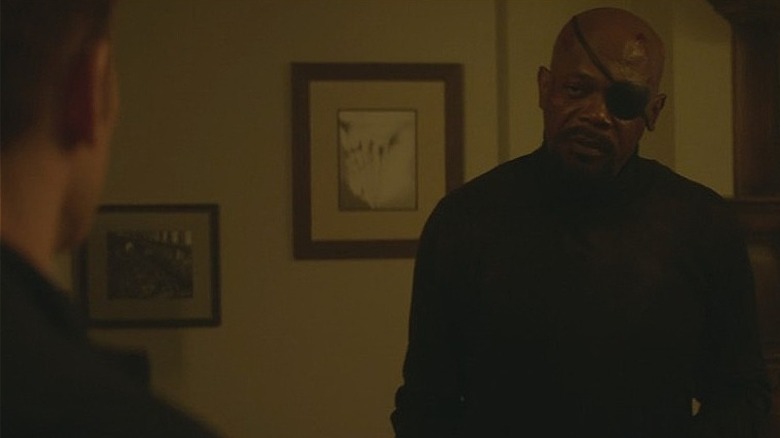Wakanda Forever Is Proof That The MCU Can't Seem To Break A Bad Habit
The newest installment in the Marvel Cinematic Universe is one that has been anticipated for years. "Black Panther: Wakanda Forever" is the close-out of a phase that took a completely different path than the previous three. While those built to an eventual team-up for the Avengers, this phase seemed to be merely setting the stage by introducing new characters and new ideas. However, the latest adventure of the King of Wakanda sat on uncertain ground due to the untimely death of the star who appeared as the character in four previous films.
So far, "Black Panther: Wakanda Forever" is a hit for Marvel. According to Rotten Tomatoes, 85% of the 330 critics and 95% of the 10,000 verified viewers who reviewed the movie enjoyed it. Wendy Ide of The Guardian wrote that the film has a return to an emotional core while attempting to bounce back from Chadwick Boseman's devastating death, saying, "[Director Ryan] Coogler leans into the pain shared by Boseman's colleagues and fans alike and crafts an unexpectedly sober picture that explores the grieving process."
And, while there is no shortage of love for the film and a lot of attention given to Angela Bassett's performance, with Entertainment Weekly even speculating an Oscar nod, some criticisms exist. Like any movie in a franchise with a dedicated fanbase, there are always divisive thoughts, but there seems to be one particular problem with this film that is not new to the MCU.
Death is merely a tool
For everything Marvel Cinematic Universe does correctly, dealing with death is something they have yet to embrace in the way other franchises do. When the theme is used correctly, it can provide raw, emotional moments that add a level of depth to films that most comic book movies, Marvel movies specifically, have almost always lacked. With the unexpected death of Chadwick Boseman, Marvel would be forced to deal with the concept of death and mourning the way the real world does. There needed to be a finality to it, with no hope of a return simply because fans wanted it. It would require a commitment.
Jeremy Mathai of /Film put his thoughts on this particular MCU trend. "I came away from this 'Black Panther' sequel convinced that it only reinforces the issues prevalent throughout Phase Four," he wrote. "For all that it does well, 'Wakanda Forever' falls back on perhaps the most disappointing and overdone MCU habit of them all: the fact that death doesn't matter." He went on to talk about the problem that Marvel has always had with death, writing, "The popular criticism that death never matters in the MCU is only somewhat of a misnomer. Despite all the attention paid to the trend of tension-deflating resurrections and fake-outs, characters die and stay dead all the time, sometimes even in droves! The bigger issue is who gets afforded the luxury of having their deaths mean something substantial, and who doesn't."
Of course, the concept of death, or possible death, has always been present in the MCU, but they have rarely committed to it. As Mathai pointed out, some characters are too important to die, either because of the money they bring in or because killing them would take the fantasy away from the escape that is the MCU.
Marvel has a complicated history with death
This isn't to say characters don't die in the MCU; they do all the time. The problem the writer brings up is more about why do some deaths get to mean something and others don't? For instance, Thor (Chris Hemsworth) is someone that dealt with death throughout his entire arc in the MCU. He lost Loki (Tom Hiddleston) in "Thor," his mother Frigga (Rene Russo) in "Thor: The Dark World," Odin (Anthony Hopkins), and his sister, Hela (Cate Blanchett) in "Thor: Ragnarok," Loki again in "Avengers: Infinity War," and finally Jane (Natalie Portman) in "Thor: Love and Thunder." But some of these are major, some come back, and others are forgotten.
In instances when a character's death can lend a little character growth or spark a specific narrative writers want to tell, death is used as a tool. Other times, it is so matter-of-fact that they are never thought of again. When the MCU set up the returns of characters like Bucky Barnes (Sebastian Stan), Phil Coulson (Clark Gregg), and Nick Fury (Samuel L. Jackson), it took away the stakes of death in a lot of ways. Even the most significant death in the Marvel Cinematic Universe, Tony Stark, leaves room for a return as fans call for the multiverse variant to return.
Death is something we have to deal with in the real world every day, with matching real-world ramifications. In the MCU, death only matters if it matters for the storyline. In "Wakanda Forever," the deaths of thousands in a war between nations are minimized by the death of one King. Who decides when a death is important and when we can move on to the next film and forget about it?


